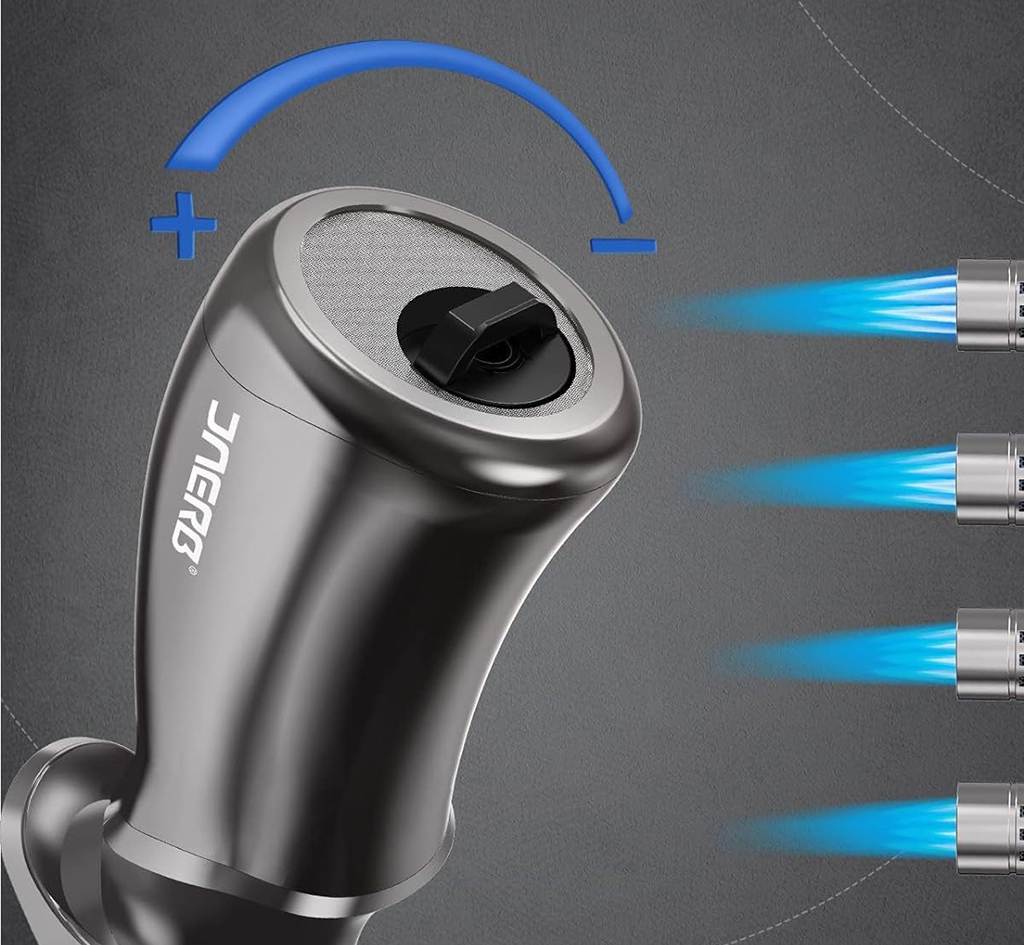Torch lighters light candles, campfires, cigars etc. However, sometimes my lighter makes a weird sound, it can be disruptive and irritating, especially in quiet environments. I know you are thinking, How to Make My Torch Lighter Silent?
The good news is that there are some simple ways to make your torch lighter and quieter.
In this article, we’ll guide you on how to make my Torch Lighter silent. If you put in some effort, you can use a clickless torch lighter without messing around.
10 Methods: How to make my torch lighter silently with Butane
Wear a lighter sleeve.
A lighter sleeve is a small, flexible piece of material that fits snugly over the body of a lighter. It is typically made from silicone or rubber, and it serves several purposes:
- Protects the e-lightweight device from damage: A lighter sleeve can protect your device from scratches, dents, and other damage. This is especially true if you carry your lighter in your pocket or purse.
- Improves grip: A lighter sleeve can make it easier to grip your lighter, especially if it has a smooth or slippery surface. This can be helpful if you have sweaty hands or use your lighter in cold weather.
- Reduces noise: A lighter sleeve can muffle the sound of escaping gas from your lighter. This can be helpful if you are trying to be stealthy or using your lighter in a quiet environment.
How to use a light sleeve?
To use a lighter sleeve, simply slide it over the body of your cigarette. The sleeves should fit snugly but not be too tight. Once the sleeves are in place, you can use your lighter as usual.
Consider using a lighter case.
A lighter case is a protective covering that encases your lighter, providing an extra layer of defense against damage and wear. It typically comes in various materials, such as leather, metal, or plastic, and offers a range of benefits, including:

- Enhanced Protection: A lighter case shields your delicate lighter from everyday wear and tear.
- Noise Reduction: The case’s material absorbs gas sound, making your torch lighter, quieter, and more discreet, especially in quiet environments.
- Style and Customization: Light cases come in a wide range of styles, designs, and colors, allowing you to personalize your lighter and express your individuality.
- Grip and Handling: A lighter case can improve your grip on the lighter, especially if it has a smooth or slippery surface, making it easier to handle, especially in cold or wet conditions.
How to use a lighter case
Select a lighter case that matches your lighter’s dimensions and shape. Check compatibility before purchasing. Gently slide your lighter into the case, ensuring it fits snugly without being too tight.
If the case has a lid or clasp, fasten it securely to keep the lighter in place and prevent it from falling out. Use your lighter as usual while taking advantage of the case’s additional protection and noise reduction.
Read Also: Top 6 Excellent Features Of AR-15 Lighter That You Probably Don’t Know
Silence your lighter: How to Make My Torch Lighter Silent
For the ultimate in silence, consider investing in a lighter silencer. This specialized device attaches to the end of the lighter, silencing the gas flow. Silencers are typically made from aluminum or stainless steel, so they can be more expensive than other options.
However, they are very effective at reducing the sound of your lighter and can make it practically silent!
Gas with low volume:
If you’re looking for a cheaper way to keep your torch lighter silent, try using low-volume gas. Low-volume gas is simply regular butane pressurized to a lower level. This makes it quieter when it escapes from your lighter, making it ideal for those who want a stealthy option.
Keep butane usage to a minimum.
Another cheap way to make your torch lighter silent is to use minimal butane. This means only filling your tank partially, which will reduce noise when gas escapes. You will also run out of fuel faster if you use less butane. This may not be ideal for those who need lighters for long periods of time.
Use a propane torch or lighter.
Propane torch lighters are generally quieter than butane torch lighters. This is because propane burns at a lower temperature than butane, which produces less noise.
Keep the flame soft.
Low-volume gas is a type of butane fuel pressurized to a lower level than traditional butane. This means that the gas expands less rapidly when released from the lighter, which results in a quieter sound.
How does low-volume gas make your light quieter?
When you light a torch lighter, butane fuel is released from the tank and ignites. This creates a rapid gas expansion, which is what causes the hissing sound. Low-volume gas expands slower, so it produces quieter sounds.
How to use low-volume gas in your torch lighter
To use low-volume gas in your torch lighter, you will need low-volume butane. You can find low-volume butane in most convenience and hardware stores. Once you have a can of low-volume butane, fill your lighter as you would with traditional butane.
Light your torch in a quiet environment.
If you’re trying to be stealthy, try lighting your torch and lighter in a quiet environment. This will help muffle the sound of gas escaping.
Read Also: How To Use A Scorch Torch Lighter Safely And Effectively
Windproof torches or lighters are useful:
Windproof torch lighters have a unique design that stops the wind from blowing out the flame. This can also help reduce the lighter’s noise, as the wind will not make the flame flicker.
Keep your torch lighter clean.
A clean torch lighter will be quieter, more efficient, and safer to use. Dirt and debris can clog the lighter’s jets, which can make the flame erratic or even extinguish. This can lead to wasted fuel and safety hazards.
How to clean your torch lighter?
Gather the necessary supplies.
Use cotton swabs to gently clean the lighter’s jets and exterior. Compressed air can remove dust and debris from lighter jets. Rubbing alcohol can remove stubborn dirt and grime. Take a soft cloth to wipe down the light’s exterior.
Cleaning the jets:
To access the jets, you may need to remove the fuel tank. Refer to your lighter’s manual for instructions on how to do this. Gently dip a cotton swab in rubbing alcohol and clean the jets. Be careful not to damage the jets.
Use compressed air to remove any remaining dirt or debris from the jets.
Cleaning the exterior:
Use a soft cloth to wipe down the light’s exterior. This will help remove dirt or grime. Use a cotton swab dipped in rubbing alcohol to clean the fuel tank opening. This will prevent dirt from entering the tank.
Reassemble the lighter.
Once the lighter is clean, reassemble it according to your lighter’s manual.
Why do Torch Lighters Make Noise?
Torch lighters produce a distinctive hissing sound when ignited. Here are some factors contributing to this phenomenon:
Rapid Gas Release: The core reason behind the hissing sound is the sudden release of pressurized butane gas. As the gas rushes out of the lighter’s nozzle to produce the torch flame, it emits a hissing noise.
Wear and tear: Over time, torch lighter internal components may become loose or worn. This deterioration can lead to additional gas leakage, amplifying the hissing sound.
Clogging Issues: The accumulation of dirt or debris within the lighter can obstruct gas flow. This obstruction can cause gas to release irregularly, leading to increased noise.
Flame Adjustment: If the flame setting on the lighter is too high, it necessitates a greater release of gas. Consequently, this increased gas flow contributes to a louder hissing sound.
It is important to understand these aspects so that you can maintain your torch lighter and reduce noise levels. It is a good practice to clean your lighter regularly and adjust its flame size correctly so that it operates smoothly and quietly.








